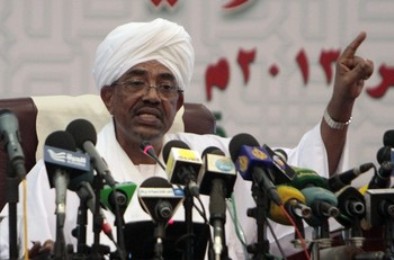Bashir pledges major changes in Sudan’s government
November 16, 2013, (KHARTOUM) – The Sudanese president, Omer Hassan Al-Bashir, has announced that the ruling National Congress Party (NCP) would carry out structural changes in the government’s legislative, executive, and political bodies at federal and state levels in the upcoming cabinet reshuffle.

Bashir, who was addressing the opening session of the NCP’s Shura (consultative) council on Saturday, wished success in choosing the powerful, efficient, honest persons who respect teamwork and institutions.
There have been mounting signs of divisions within the NCP and frustration particularly within the younger generations in the party about the lack of change in the leadership. Many traditional figures in the ruling party retained their positions for more than two decades.
Despite numerous pledges by Bashir and other senior NCP officials of major overhaul, the ruling party has yet to satisfy its disgruntled members with a structural change in government and faces that could counter economic and political challenges in the country.
The NCP leader pointed that the priorities of the new government are achieving peace and security, imposing government authority, and enforcing the rule of law, saying that they are open to listen to observations and criticisms of party members as long as it stems from good intentions and for Allah (God) sake.
“Reform doesn’t come from those who seek to fragment the party in times of distress”, he said alluding to a recent rift in the party led by Ghazi Salah Al-Deen Al-Attabani.
Bashir called upon his party members not to lose confidence in themselves in the face of failure, saying that they made significant achievements despite the great challenges.
He considered the NCP’s experience a human experience governed by Islamic values, describing it as a “luminous candle” which must be nurtured through impartiality and self-denial among party members in order to turn into a “bright sun”.
Bashir urged members of the Shura council to detect the shortcomings and correct the mistakes and stressed that it is high time for ending the suffering of the people in Darfur and South Kordofan, saying that their displacement is caused by the rebel armed groups.
He addressed the rebels and those whom he described as “saboteurs” saying that dialogue is the only way for achieving political change.
The Sudanese president further warned Sudanese people particularly the youths against cultural alienation, stressing the need to stand up to satellite channels which serve as tools for cultural and moral invasion.
He pointed to some radical religious ideas which drive youths to violence and Takfeer (excommunication), saying that those ideas are alien to the Sudanese society.
Bashir directed NCP members to activate the party and turn it into a centre for intellectual and cultural radiation which disseminates enlightened thinking and constructive values.
He asserted the NCP need to make use of all means of publishing, media outlets, research centres, and publications to refute the destructive ideas, calling upon universities and research centres to play their part in facing the cultural alienation campaigns.
10 DAYS FOR REFORMISTS
In the same context, the Shura council gave the reformists leaders including the former presidential advisor Ghazi Salah Al-Deen Al-Attabani, Hassan Osman Rizg, and Fadlallah Ahmed Abdallah, a 10-day ultimatum to review their stances with regard to the recent memorandum they presented to president Bashir.
According to Sudan’s official news agency SUNA, the Shura council decided to apply the party’s rules and dismiss the mentioned members if they refused to back away from their positions within 10 days.
Last September, 31 NCP members presented a memo to president Bashir criticizing the government’s decision to remove subsidies on fuel and other basic commodities, saying it “harshly” impacted Sudanese citizens.
The signatories, that included former presidential adviser Al-Attabani along with several lawmakers and retired military officers, said parliament had not been consulted over the latest economic measures, which were opposed by sections of the NCP.
They also chided the government for the excessive violence used against protestors who took the streets against the subsidies cut and called for deep political and economic reforms.
They also urged Bashir to form a mechanism for national reconciliation comprised of various political forces and assign the economic dossier to a professional national economic team.
“The legitimacy of your rule has never been at stake like it is today” they said in their letter to Bashir which was seen as a direct challenge to the president who is now the country’s longest serving leader.
Bashir formed a committee headed by national assembly speaker Ibrahim Al-Tahir to query those whose names appeared in the petition that was circulated publicly.
The commission of inquiry recommended the dismissal of Al-Attabani along with two other members and suspending nine others.
Al-Attabani later declared his intention to leave the party and form a new one that would “bring new hope to Sudan”.
The first split within the NCP took place in 1999 following a bitter power struggle between Bashir and Islamist leader Hassan Al-Turabi, with the latter subsequently ousted from his post as parliament speaker.
Al-Turabi later established the Popular Congress Party (PCP) and has since been a vociferous critic of the very regime for which he orchestrated the army-backed seizure of power in 1989.
The NCP has been facing growing difficulties particularly as its coffers dried up after the oil-rich south became an independent nation in July 2011.
(ST)
